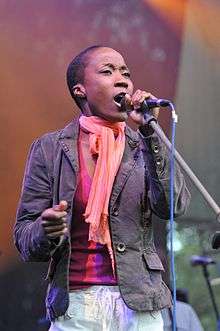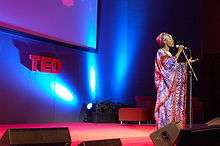Rokia Traoré
| Rokia Traoré | |
|---|---|
 Rokia Traoré at INmusic festival in 2009. | |
| Background information | |
| Born | January 26, 1974 |
| Origin | Kolokani, Mali |
| Genres | World Music |
| Occupation(s) | Singer, songwriter, guitarist |
| Years active | 1997–present |
| Website | http://www.rokiatraore.net |
Rokia Traoré (born January 26, 1974) is a Victoires de la Musique award-winning Malian singer, songwriter and guitarist, born in Mali as a member of the Bambara ethnic group. Her father was a diplomat and she travelled widely in her youth. She visited such countries as Algeria, Saudi Arabia, France and Belgium and was exposed to a wide variety of influences. Her hometown of Kolokani is in the northwestern part of Mali's Koulikoro region.
While the Bamana have a tradition of griot performing at weddings, members of the nobility, such as Rokia, are discouraged from performing as musicians. Rokia attended lycée in Mali while her father was stationed in Brussels and started performing publicly as a university student in Bamako. Rokia plays acoustic guitar as well as sings, and she uses vocal harmonies in her arrangements which are rare in Malian music. In 1997, she linked with Mali musician Ali Farka Touré which raised her profile. She won an Radio France Internationale prize as "African Discovery" of 1997, an honor previously won by Mali's Habib Koité in 1993. As well as guitar she plays ngoni (lute) and balafon.
Her first album Mouneïssa (Label Bleu), released in late 1997 in Mali and September 1, 1998 in Europe, was acclaimed for its fresh treatment and unqualifiable combinations of several Malian music traditions such as her use of the ngoni and the balafon. It sold over 40,000 copies in Europe.
On July 11, 2000, her second album Wanita was released. Traoré wrote and arranged the entire album. The album was widely acclaimed with The New York Times nominating it as one of its critics' albums of the year.
Her 2003 album Bowmboï has two tracks recorded with the Kronos Quartet but still sung in the Bamana language, and was awarded the prestigious BBC Radio 3 World Music Award. As of 2005, she has been nominated three times for this award. She played at WOMAD in 2004 and completed her first tour of North America in the same year.

In 2005 she performed at the "Africa Live" festival, held in Dakar (Senegal) on 12 and 13 March 2005, where several great names of African music were present, including: Malians Ali Farka Touré, Salif Keïta, Oumou Sangaré, Tinariwen, Tiken Jah Fakoly of Côte d'Ivoire, Cameronian Manu Dibango, Algerian Khaled, Senegalese Didier Awadi, Baaba Maal and Youssou N'Dour, and the French rapper Joey Starr. These concerts were dedicated to the fight against malaria in Africa.
In 2005 she also performed at the Youssou N'dour and Friends concert in Geneva, which was also a supporting gala against malaria, with Peter Gabriel, Amadou and Mariam, Gilberto Gil, Tiken Jah Fakoly and Neneh Cherry.
In December 2006 Peter Sellars' New Crowned Hope festival, which is part of the City of Vienna's celebrations commemorating Wolfgang Amadeus Mozart's birthday 250 years ago, saw the world premiere of Wati, a performance by Rokia Traoré and the Klangforum Wien.
On May 6, 2008, her album Tchamantché was released.
Rokia was the winner of the Best Artist category in the inaugural Songlines Music Awards (2009) - announced May 1, 2009 - the new 'world music' awards organised by the UK-based magazine, Songlines.
She wrote the music for the 2011 Toni Morrison play Desdemona.[1]
In September 2012, she was featured in the campaign "30 Songs / 30 Days" to support Half the Sky: Turning Oppression into Opportunity for Women Worldwide, a multi-platform media project inspired by Nicholas Kristof and Sheryl WuDunn’s book. [2]
In 2013 her latest album Beautiful Africa was released. She performed at Glastonbury Festival.
She was selected to be on the jury for the main competition section of the 2015 Cannes Film Festival.[3][4]
Discography
| Year | Album | Peak positions | ||
|---|---|---|---|---|
| BEL (Fl) |
BEL (Wa) |
FR [5] | ||
| 1998 | Mouneïssa | – | – | – |
| 2000 | Wanita | – | – | – |
| 2003 | Bowmboï | – | – | 43 |
| 2008 | Tchamantché | 76 | 63 | 35 |
| 2013 | Beautiful Africa | 86 | 120 | 66 |
| 2016 | Né So | 49 | 139 | 77 |
References
- Rough Guides World Music the Rough Guide: Volume 1 Africa Europe and the Middle East Second Edition London 2000 page 560
- Artist webpage
- Rokia Traoré at AllMusic
- BBC Womad 2004 article
- BBC World Music 2005 Award page
- African Musician Profile page on Traoré
- Billboard Magazine profile of Traoré published July 15, 2000
- Songlines Music Awards 2009 page
- Interview and acoustic concert at the Music Meeting 2009 festival
- ↑ von Uthmann, Jorg (19 October 2011). "Desdemona Gets Even in Morrison-Sellars Othello Remix: Review". Retrieved 2011-10-23.
- ↑ http://www.halftheskymovement.org/blog/entry/30-songs-30-days-for-half-the-sky1
- ↑ "The Jury of the 68th Cannes Film Festival". Cannes Film Festival. Retrieved 21 April 2015.
- ↑ "Jake Gyllenhaal, Sienna Miller and Guillermo del Toro Join Cannes Film Festival Jury". The Wrap. Retrieved 21 April 2015.
- ↑ "Rokia Traoré Discography". lescharts.com. Hung Medien. Retrieved 14 April 2012.
External links
| Wikimedia Commons has media related to Rokia Traoré. |